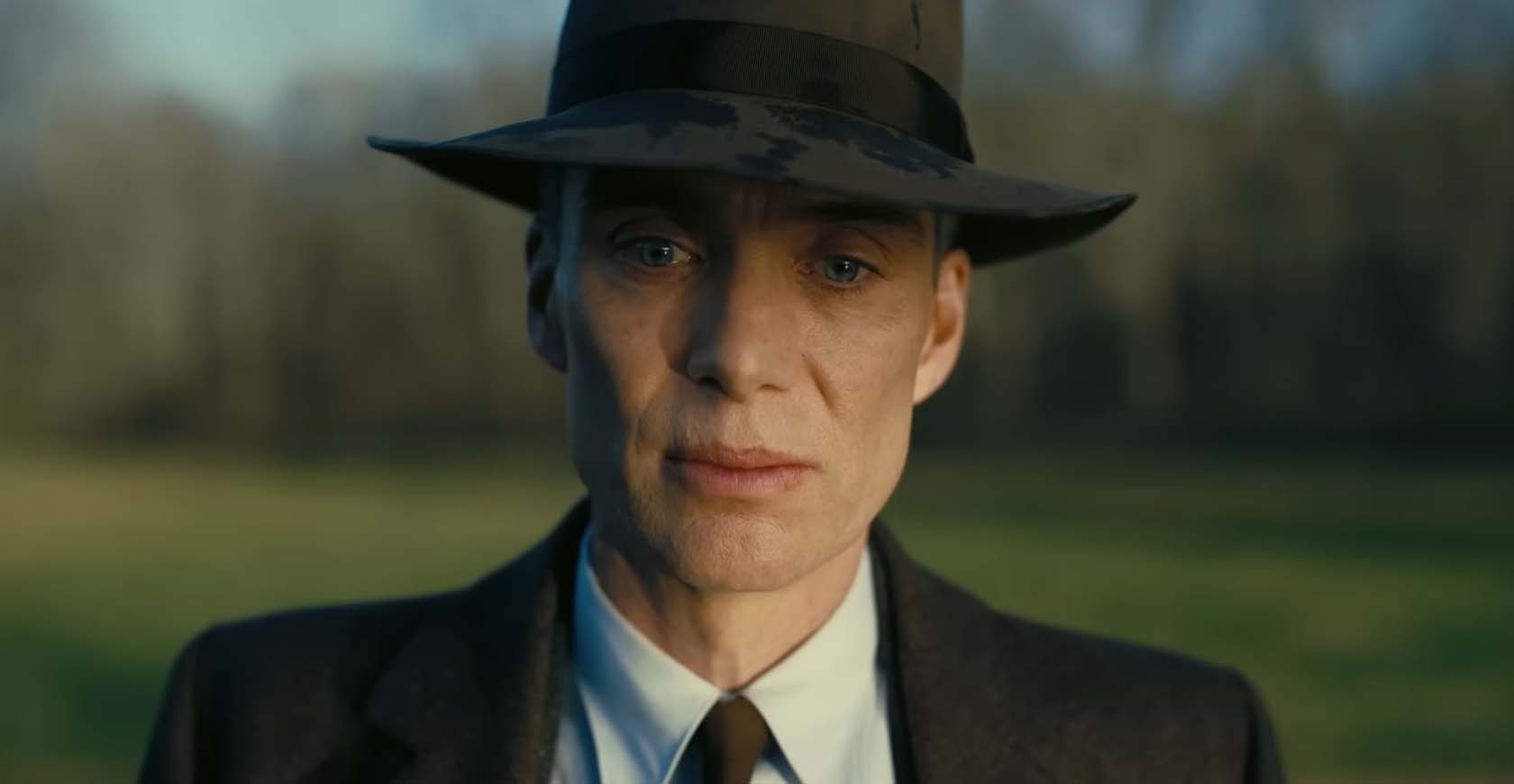So I have finally seen Christopher Nolan’s Oppenheimer, and already, it’s my favorite movie of the year so far. I was completely floored by Nolan’s epic telling of the atomic bomb’s creator, and I’m not going to lie, I think it may be one of the very best films in his filmography.
In short, it’s a masterpiece from start to finish. The performances were outstanding, the character work is the most compelling it’s ever been, and the filmmaking is some of the most inventive on a large scale that we’ve seen from Nolan. Of course, he loves to push the bar in some way with every film he puts to screen, but with this one, there’s top-tier execution across the board in big and smaller, more intimate ways too.
So in this article, I’m going to be giving you my spoiler-free review of Christopher Nolan’s Oppenheimer, discussing why it’s now one of my favorite films by the blockbuster director.
Oppenheimer Review
I went into watching Oppenheimer leaving all expectations and early hype at the door, ready to just experience this monumental story for the first time and really discover how Nolan has tackled the complex story of this man’s life as presented in the book American Prometheus. And boy, was it one hell of an experience.
Having read the book myself I already had an understanding of the material and the broad sketches of Oppenheimer’s life that were going to be brought to life. And what really stands out with Nolan’s adaptation is how he’s intricately constructed this story in both big and smaller ways from top to bottom.
When you’re making a biopic film, yet the story demands a huge scale and themes that relate to all of us on this very planet, I think you have to approach it that way regardless of having a filmography full of the more artistic blockbusters with lots more action.
You have to capture the intimacy with the performers using up-close photography, yet you have to present the scale involved when it comes to detonating an atomic bomb or showing the implications that this story has.
So Nolan took that on by developing new IMAX tech that can capture more of the drama and conversations with deeper emotion, yet using it to also film all of the mind-boggling visuals both inside Oppenheimer’s head and in the New Mexico desert during the Trinity test, it just highlights the extent to which he’s gone to with this project.
This isn’t one genre of film on show, and like Oppenheimer’s story, it captures a huge range of filmic tones and story points that will make you ask at the end, how has Nolan managed to pull this off so effortlessly?
Does Oppenheimer Adapt The Novel Well?
Speaking of pulling it off, I think the best place to start would be my astonishment surrounding the adaptation of the novel’s telling to screen. After reading American Prometheus, I had concerns surrounding how Nolan would tackle the long list of ethical concerns, moments in history, scientific knowledge, and political points through his complex structure of filmmaking.
It turns out that telling this story through both subjective black and white and objective color and intercutting throughout was a touch of genius.
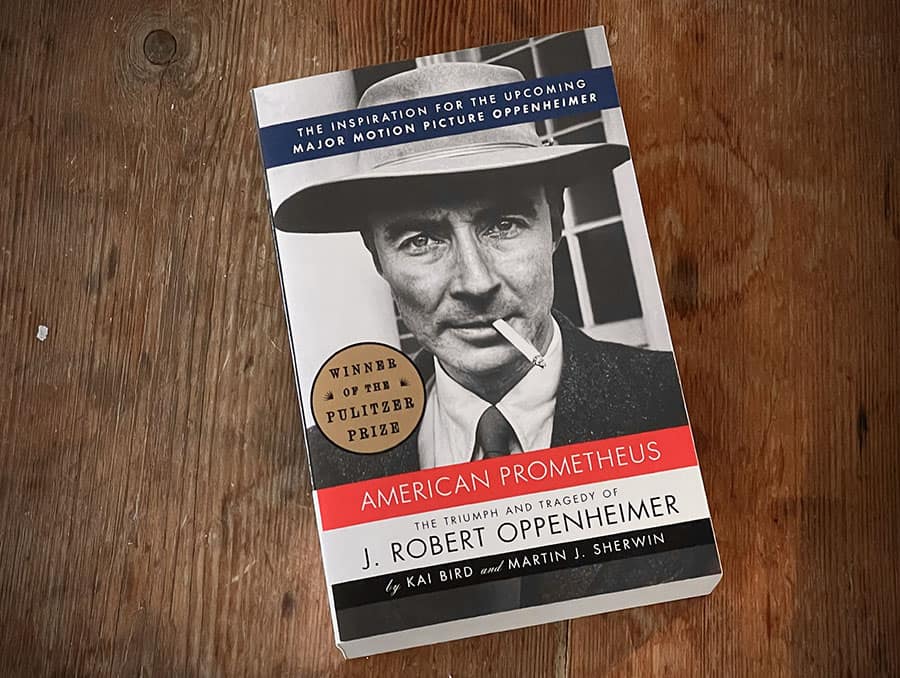
Nolan expands on the book by really placing us inside Oppenheimer’s mind or detailing what he might have been feeling and grappling with, and then superbly contrasts that with the black and white thread, which features the perspective of Robert Downey Jr’s Lewis Strauss.
We get his outlook towards everything going on with Oppenheimer, the bomb project, and the concerns over his communist ties. The intrigue this creates and the way Nolan and his team recreate the many conversations involved make you feel like you were there that you experience that history with them, feel their motives, and question it all deeply yourself. And that’s the thing about this adaptation; it’s incredibly attentive to detail.
The importance of the supporting players like Jean Tatlock and Frank Oppenheimer, the integration of those figures and their ties to communism, and the investigation of Lewis Strauss later on, are moments in the book that I never thought would make it to screen or moments that didn’t need to be adapted. And yet Nolan captures it in detail and makes it highly relevant to everything going on.
On top of this, the characters’ voices and gestures are all brought to the screen well by the performers, and you can tell the research had been done, not just at the script stage and in pre-production but actually leading up to and during the shoot as well.
We’re actually there in Los Alamos experiencing and dealing with the issues surrounding the unleashing of nuclear energy and then, of course, afterward, too, when the genie had been let out of the bottle. Even extended lines from the actual transcript of the Oppenheimer trials are delivered truthfully, and just like Kai Bird and Martin Sherwin’s book, it plays out like an intense thriller.
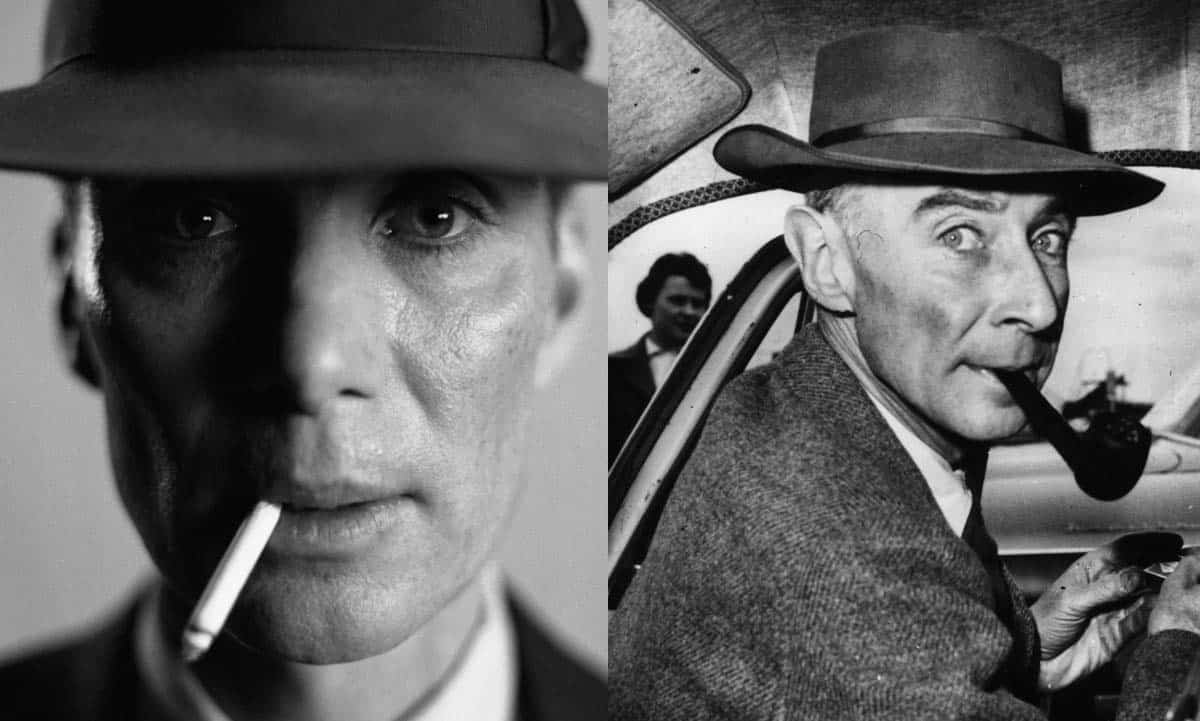
But as I touched on slightly before, what really makes this Christopher Nolan’s own new masterpiece is the fact that he’s done stuff that wasn’t there on the pages. He’s gone deep into Oppenheimer’s mind and tried to imagine what he may have been feeling or thinking about, and in fact, showing two historical perspectives towards the whole situation make it that much more thrilling and compelling.
Rather than have it just play out like a docu-drama, he’s imagined it as a thriller and expanded upon the biopic by attempting to investigate the mind of the central character in new ways. It’s the kind of experimental effort that you need with a story like J. Robert Oppenheimer’s, and while being respectful to the material, it also opens up a new way of seeing and questioning this story.
The Performance Of Cillian Murphy In Oppenheimer
Questions are the key phrase because Oppenheimer leaves you with a lot of them. And Cillian Murphy’s acting really helps drive that questioning. It’s an academy award level performance, with the returning Nolan acting bringing the gestures of the man to life and delivering dialogue that captures the prophet-like attributes of Oppie but also his inner trauma.
In fact, it’s a perfect lead performance that showcases a full turn in ideology. And seeing him go from many supporting roles in Nolan’s features to giving such a triumphant yet dramatic one here is just so great to see.
You feel his fear in the moments leading up to the Trinity test, and you feel his anxiety and depression afterward, yet you are shown his insane intelligence and world-changing expressions too. Cillian makes that believable and more human than Oppenheimer was on the pages of American Prometheus, and it’s a true testament to his performance here.
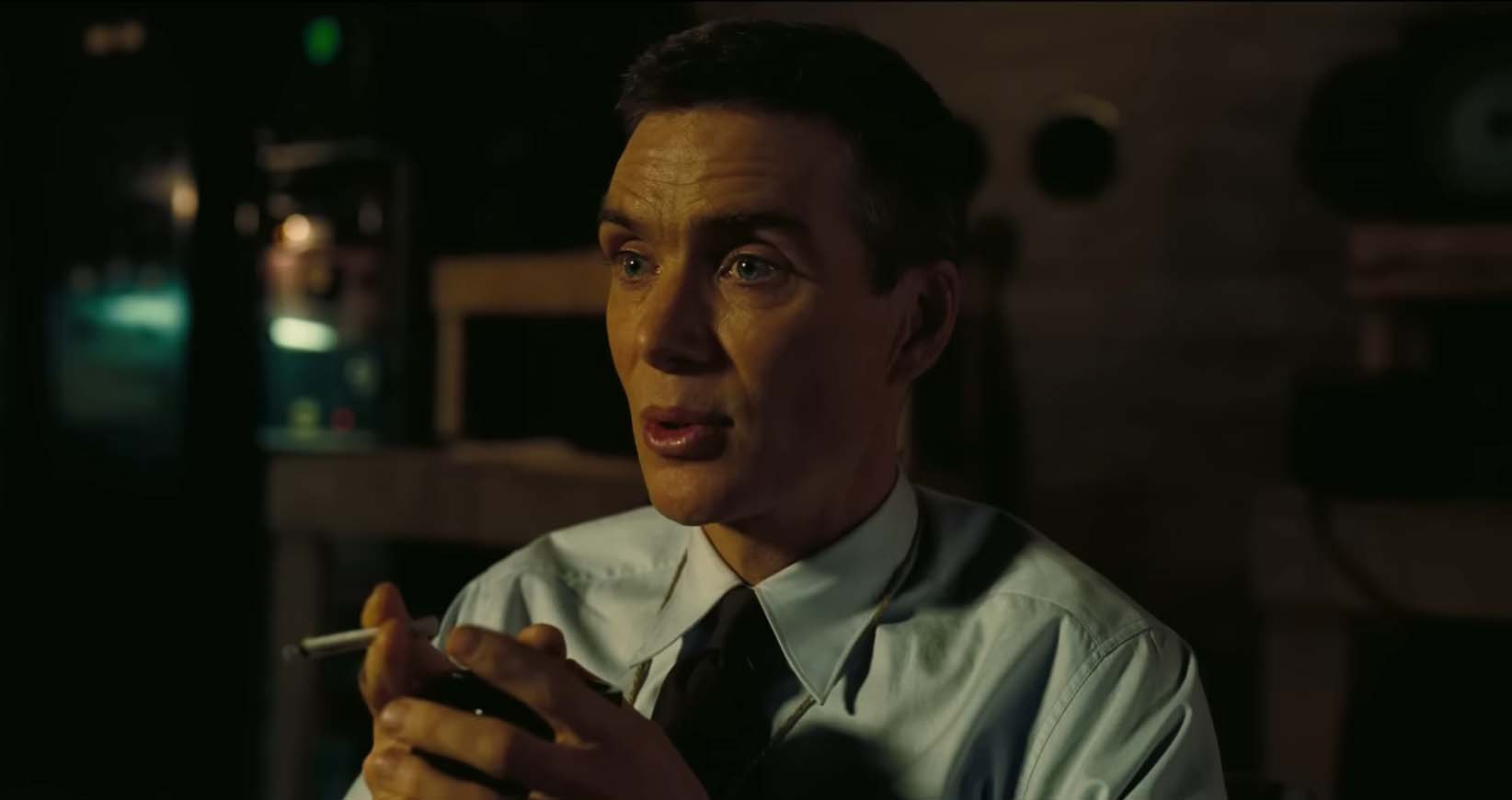
But I cannot say it was only down to him because the supporting cast is equally as formidable. Robert Downey Jr plays Lewis Strauss with the relentlessness we expect but then also with an angle that makes you see how he might have seen things his way. It’s a supporting role that I think will have huge Oscar buzz for the remainder of the year.
Emily Blunt further delivers a unique and emotional performance as Kitty Oppenheimer, allowing us to see her and her husband’s troubles even more so, especially during the 3rd act of the movie. Florence Pugh is explosively good as Jean Tatlock, making her character highly important in the 8 scenes of screen time she gets.
It’s these performances and many other surprise roles throughout that make you realize what a great move it was on Nolan’s part to harken back to his early days of traumatic and troubled character work. So on an adapted storytelling and performance level, Oppenheimer has really fired on all cylinders.
IMAX Cinematography, Score, And Amazing Filmmaking
But it doesn’t end there because, as suggested previously, filmmaking takes this all to the next level. As mentioned, the inventive IMAX cinematography using new cameras, both in color and black and white, paints a completely compelling picture.
There are, yes, huge vistas and explosions, but there are also a lot of intimate moments where you literally see every pore in the actor’s faces. We haven’t seen this level of effort put into capturing dialogue scenes and more intimate moments using an IMAX camera before, and that really helps to transport us right next to these characters.
It absolutely works, and it ups the bar for how event films and even more intimate features can be filmed using IMAX technology. The score is also its own character in the film too, and while this might be jumping the gun, having only seen it once, I think it might have matched Inception as my favorite soundtrack in a Nolan film.

Ludwig Gorannson crushes it and delivers a range of motifs in the themes he’s created, whether it’s Oppenheimer’s theme or the one for him and Kitty. On top of this, the production work and how they’ve rebuilt Los Alamos and filmed in real places, like the Institute for Advanced Studies or Oppenheimer’s actual house, really puts you in these places and lets you feel the authenticity of the moment.
I can’t stress how much this helps in the experience of watching Oppenheimer, and seeing it in 70mm will likely only enhance that experience. I myself am watching it in that format in the coming weeks, and I can’t wait to see the detail of this film in an even crisper format.
Will Oppenheimer Be The Greatest Film Of The Year?
But so far, having only seen it once in regular IMAX, it’s clear to me that Oppenheimer is the kind of film that can define a cinematic auteur. To me, this is the best of the very big and the very small in filmmaking. When a director can capture detail, intimacy, and immersion so successfully on such a large scale using the biggest technology, it’s very apparent that Nolan has quickly become one of the industry’s best all-time filmmakers. And I think Oppenheimer is the film to staple that impression.
It’s one of his finest cinematic achievements, and that’s even after giving us multiple groundbreaking big event films and character movies in the past. He combines all of that experience here in probably the perfect story and character project. You can feel his worries about nuclear power and how he saw that in Oppenheimer’s story. There’s even a moment in this film that involves his actual daughter, which made my skin crawl.
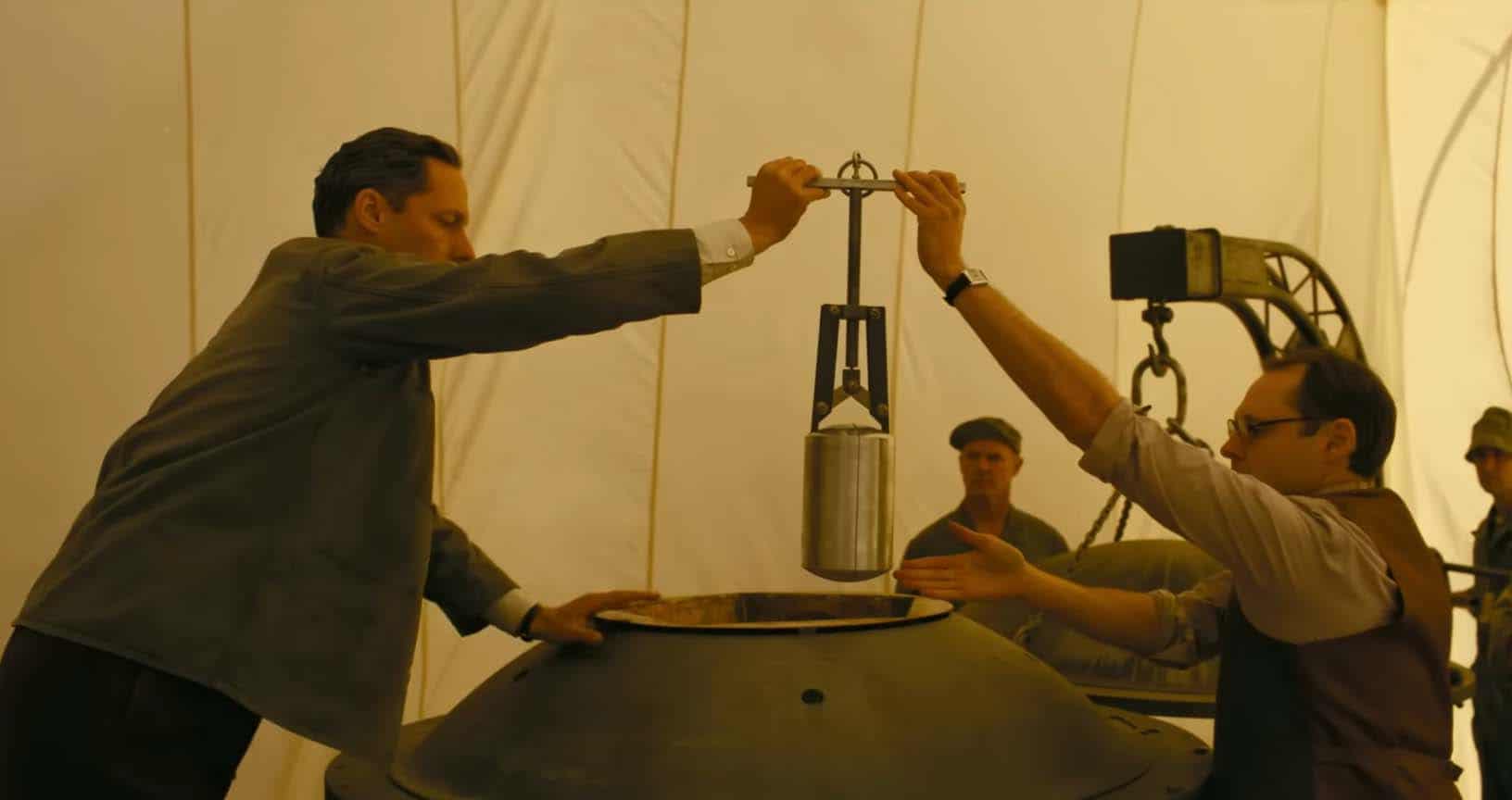
But that’s exactly what Nolan wants you to feel. He wants you to have these questions, to think about the many dilemmas and what they mean today. You know you have an all-time great historical film when the central ideals are expertly transferred onto the present landscape that we deal with today. And you get that so much with Oppenheimer. It makes you think about the tension of the doomsday clock and whether we might ever run out of time.
It makes you think about those around you and what could happen in the future surrounding this nuclear power. And it makes you wonder what these people were going through and how relevant that is to the landscape today. I honestly can’t wait to see how these many discussions expand after more people have seen the film, and I think just after one watch, that’s a great sign that the movie has done its job.
It is, in my opinion, a masterpiece, and other than some scenes which could have been trimmed down in the edit suite, and a bit more expansion surrounding a few of the supporting roles, I’m struggling to think of negatives after watching it. It’s 3 hours that fly by, and it features some of the most important storytelling on both big and small scales.
Oppenheimer Final Thoughts And Score
But that was my spoiler-free review of Christopher Nolan’s Oppenheimer. Nolan continues to put his stamp on many different genres of film, and the same can be said about his latest effort, which gives us an inventive take on the biopic movie.
But like his previous work, he combines multiple genres into one, and you really get a bit of everything here. There’s drama, there’s thrills, there’s astonishing visuals, romance, and all the horror surrounding this moment in history. Nolan effortlessly combines all of this to give us an all-time classic that I think is going to be analyzed, talked about, and debated for many years to come.
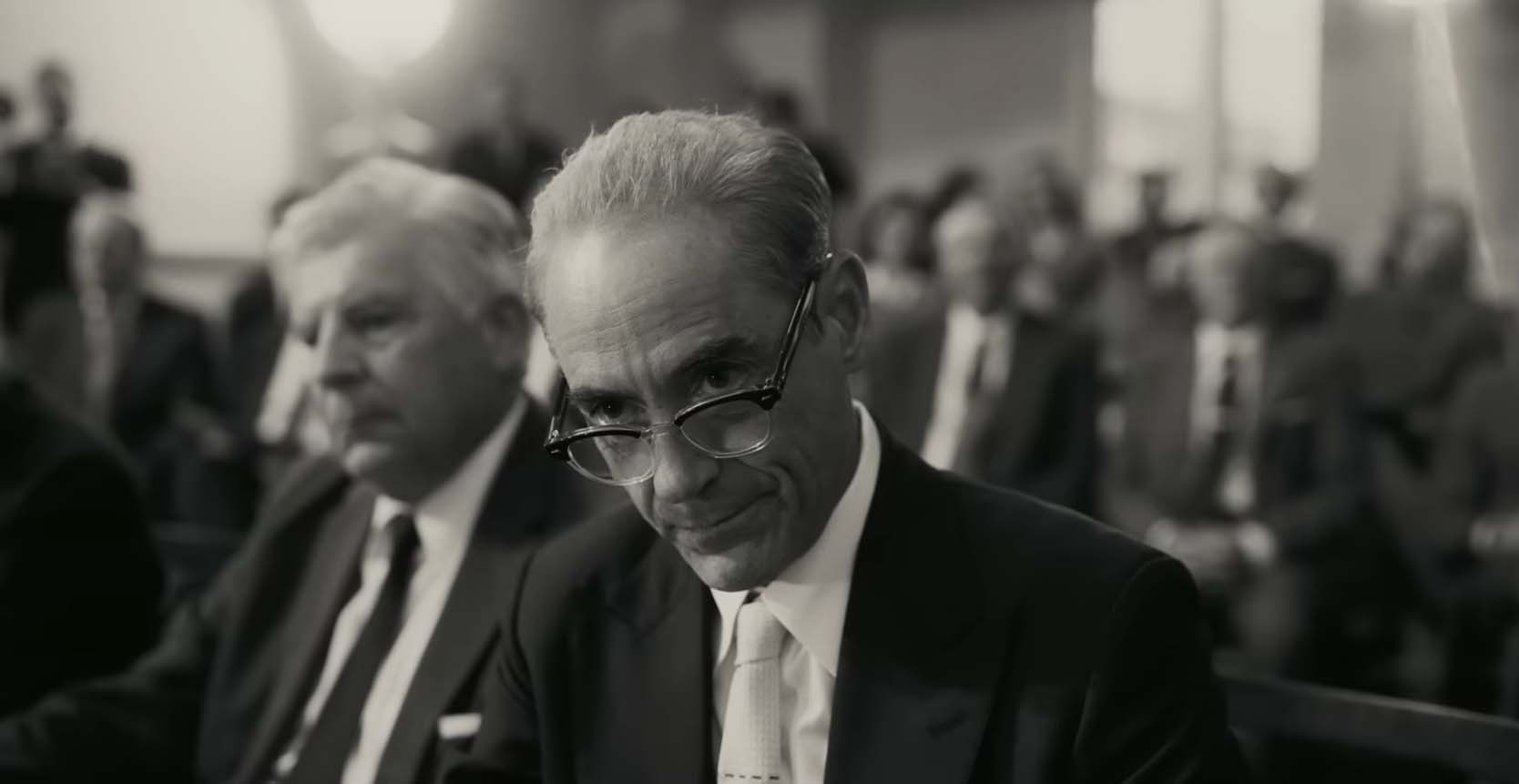
I need more watches of the film, but I think for me, having read the book and loving all of Nolan’s previous work, this might be a top 3 film in his filmography, up there with The Dark Knight and Inception. I’m giving Oppenheimer a rating of 4.8 out of 5.
But to those who have already seen the film, what do you think of Christopher Nolan’s Oppenheimer, and do you agree that it’s one of the best films of the year and one of Nolan’s best too?
I think it’s one of his best, and I wouldn’t be surprised if it got loads of Oscar nominations, especially in categories like Best Film, Direction, Acting, and Cinematography. Again, it’s all subjective, and I appreciate a range of reactions and reviews, so let me know down below in the comments section what you personally thought about the film alongside things that stood out with your first impressions.
Our Rating: ⭐ (4.8/5)

